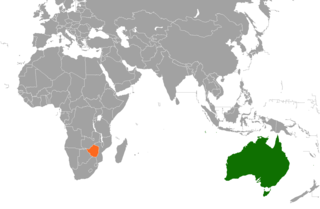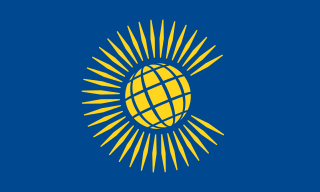Zimbabwe
Rather predictably, [3] but despite attempts to the contrary, the issue of Zimbabwe dominated. [2] Some African members had spoken out against what they saw as the 'undemocratic' suspension of Zimbabwe, but were criticised for not respecting the principle of consensus, under which dissenting voices to an issue that had already been decided and voting on are usually only heard privately. [2] Olusegun Obasanjo was seen to have acquitted himself well in the Commonwealth's position of Chairperson-in-Office in the manner in which he addressed this issue. [2]
The issue was brought to a head in the election of the Secretary-General. The incumbent, New Zealander Don McKinnon, was nominated for another four-year term, and convention stipulates that an incumbent running again is to be unchallenged. [4] However, President Thabo Mbeki of South Africa spearheaded a campaign to have Sri Lanka's Lakshman Kadirgamar elected in protest over the handling of the Zimbabwe matter. [3] Nonetheless, African countries were divided, with only five African Heads of Government voting with Mbeki, and the attempt to move the election down the agenda to provide time to develop momentum for the movement was unsuccessful. [2] With Mbeki's tactics failing, and with neither Kadirgamar nor the Prime Minister or President of Sri Lanka in Abuja, the challenge was easily defeated, by forty votes to eleven. [3]
In response to the failure to overthrow McKinnon or to lift Zimbabwe's suspension, Robert Mugabe announced on 7 December that Zimbabwe was to leave the Commonwealth immediately: marking only the third occasion (after South Africa in 1961 and Pakistan in 1971) that a country had withdrawn voluntarily. [3]
The Commonwealth Heads of Government Meeting is a biennial summit meeting of the governmental leaders from all Commonwealth nations. Despite the name, the head of state may be present in the meeting instead of the head of government, especially among semi-presidential states. Every two years the meeting is held in a different member state and is chaired by that nation's respective prime minister or president, who becomes the Commonwealth Chair-in-Office until the next meeting. Queen Elizabeth II, who was the Head of the Commonwealth, attended every CHOGM beginning with Ottawa in 1973 until Perth in 2011, although her formal participation only began in 1997. She was represented by the Prince of Wales at the 2013 meeting as the 87-year-old monarch was curtailing long-distance travel. The Queen attended the 2015 summit in Malta and the 2018 summit in London, but was represented again by the Prince of Wales at the 2022 meeting in Rwanda.

The New Partnership for Africa's Development (NEPAD) is an economic development program of the African Union (AU). NEPAD was adopted by the AU at the 37th session of the Assembly of Heads of State and Government in July 2001 in Lusaka, Zambia. NEPAD aims to provide an overarching vision and policy framework for accelerating economic co-operation and integration among African countries.

Sir Donald Charles McKinnon is a New Zealand politician who served as the 12th deputy prime minister of New Zealand and the minister of Foreign Affairs of New Zealand. He was the secretary-general of the Commonwealth of Nations from 2000 until 2008.

The Commonwealth secretary-general, formally the secretary-general of the Commonwealth of Nations, is the head of the Commonwealth Secretariat, the central body which has served the Commonwealth of Nations since its establishment in 1965, and responsible for representing the Commonwealth publicly. The Commonwealth secretary-general should not be confused with the head of the Commonwealth.

Chief Olusegun Matthew Okikiola Ogunboye Aremu Obasanjo is a Nigerian general and statesman who served as Nigeria's head of state from 1976 to 1979 and later as its president from 1999 to 2007. Ideologically a Nigerian nationalist, he was a member of the Peoples Democratic Party (PDP) from 1998 to 2015, and since 2018.

Sri Lankabhimanya Lakshman Kadirgamar, PC was a Sri Lankan lawyer and statesman. He served as Minister of Foreign Affairs of Sri Lanka from 1994 to 2001 and again from April 2004 until his assassination in August 2005. Lakshman Kadirgamar served as the President of Oxford Union in 1958–59.

Aso Rock is a large outcrop of granitic rock located on the outskirts of Abuja, the capital of Nigeria. The Aso Rock is a 400-metre (1,300 ft) prominent monolith with a peak height of 936-metre (3,071 ft) above sea level. It is one of the city's most noticeable features. The Nigerian Presidential Complex, Nigerian National Assembly, and Nigerian Supreme Court are located around it. Much of the city extends to the south of the rock. "Aso" means victorious in the native language of the Asokoro ethnic group.

The criteria for membership in the Commonwealth of Nations, which apply to current and prospective member states, have been altered by a series of documents issued over the past eighty-two years.
The Edinburgh Declaration was a declaration by the heads of government of the Commonwealth of Nations concerning the organisation's membership criteria. Part of the final communiqué issued at the end of the fifteenth Commonwealth Heads of Government Meeting (CHOGM), the Declaration was an endorsement of the report of the Inter-Governmental Group on Criteria for Commonwealth Membership (IGCCM). It was issued on 27 October 1997, in Edinburgh, the United Kingdom.

The 2007 Commonwealth Heads of Government Meeting was the 20th Meeting of the Heads of Government of the Commonwealth of Nations. It was held in Kampala, Uganda, between 23 November and 25 November 2007, and was hosted by President Yoweri Museveni.

The Commonwealth of Nations is a voluntary association of 56 sovereign states, referred to as Commonwealth countries. Most of them were British colonies or dependencies of those colonies.

Foreign relations exist between Australia and Zimbabwe. Both countries have full embassy level diplomatic relations. Australia maintains an embassy in Harare, and Zimbabwe maintains an embassy in Canberra.

The Commonwealth Chair-in-Office (CIO) is the Chair-in-Office of the Commonwealth of Nations, and is one of the main leadership positions in the Commonwealth. It is held by the host chairperson of the previous Commonwealth Heads of Government Meeting (CHOGM), and is maintained until the next CHOGM. Fiamē Naomi Mata‘afa, Prime Minister of Samoa, is the current Chair-in-Office of the association since 25 October 2024.
The 2002 Commonwealth Heads of Government Meeting was the 17th Meeting of the Heads of Government of the Commonwealth of Nations. It was held in Coolum, Queensland, Australia, between 2 and 5 March 2002, and hosted by the Prime Minister of Australia, John Howard.

Zimbabwe and the Commonwealth of Nations have had a controversial and stormy diplomatic relationship. Zimbabwe is a former member of the Commonwealth, having withdrawn in 2003, and the issue of Zimbabwe has repeatedly taken centre stage in the Commonwealth, both since Zimbabwe's independence and as part of the British Empire.
The 1999 Commonwealth Heads of Government Meeting was the 16th Meeting of the Heads of Government of the Commonwealth of Nations. It was held in Durban, South Africa, between 12 November and 14 November 1999, and hosted by President Thabo Mbeki.

The Commonwealth of Nations, often simply referred to as the Commonwealth, is an international association of 56 member states, the vast majority of which are former territories of the British Empire from which it developed. They are connected through their use of the English language and historical-cultural ties. The chief institutions of the organisation are the Commonwealth Secretariat, which focuses on intergovernmental relations, and the Commonwealth Foundation, which focuses on non-governmental relations between member nations. Numerous organisations are associated with and operate within the Commonwealth. It is known colloquially as the British Commonwealth.
Suspension from the Commonwealth of Nations is the most serious punishment that can be administered to members of the Commonwealth. In the absence of any mechanism by which to expel countries that breach its rules, the Commonwealth Ministerial Action Group (CMAG) may choose to suspend members from the 'Councils of the Commonwealth', which amounts to the suspension of their formal membership of the organisation, although their participation in activities of the Commonwealth Family of organisations is not necessarily affected.

Matthew Ernest Keith Neuhaus is an Australian diplomat who was appointed as the Australian Ambassador to the Netherlands on 29 August 2018.
Olusegun Akinsanya, mni is a Nigerian diplomat and statesman who served as the Nigerian Ambassador Extra-Ordinary and Plenipotentiary to Ethiopia and Djibouti from 2004 to 2007 and Permanent Representative to the African Union and United Nations Economic Commission for Africa from 2008 to 2010.













